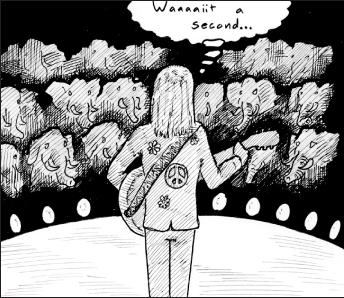Technically, Michele Bachmann may be an “American Girl,” but if she continues using the popular Tom Petty tune during her campaign, she may be next in line to meet the “Heartbreakers” of United States copyright law.
Upon hearing of Bachmann using his song during a rally, Petty immediately filed a cease-and-desist letter to the Bachmann campaign, stating that by using the song in a political context, it is implied that he agrees with Bachmann’s political agenda. Definitely a no-go for Petty, a solid Democrat.
Politicians and musicians have a long history of conflict over copyrights applying to the use of songs in political campaigns. While there are a few standout cases, politicians frequently use music without problem on the campaign trail. Whether to give an audience something to listen to as they wait in line for a handshake, or to stir a rally into a fervor, finding a proper campaign song is a must for most who run for public office.
Unfortunately for one political party, finding an artist who identifies with their views can sometimes be a daunting task. As much as I try to stay bipartisan, the evidence shows that misunderstandings between politicians and artists are almost strictly a Republican problem. Say what you want about their ideologies, when it comes to music, the GOP are largely out of touch, out of style and out of luck.
Part of the problem comes with the shallow age demographics in the Republican party. While the GOP has done a great job catering to a younger audience in this election cycle, it still can’t cover the wrinkles that lie at the center of the party’s base. As a result, most Republican politicians forgo the modern music scene entirely and rely on the music of past generations to pump up an older crowd during a rally.
Petty’s strike against Bachmann looks to be the first shot against the GOP by a popular musician during this election, but if the 2008 presidential election is any determinant, it certainly won’t be the last.
During the McCain/Palin campaign, the candidates were told by such musicians as John Mellencamp, Jackson Browne, the Foo Fighters, ABBA and Heart to quit using their music for political purposes. What Republicans don’t seem to understand, is that music often has a deeper meaning than a simple repeated chorus line. “Born in the USA” by Bruce Springsteen may seem like a great catchphrase for old-school conservatives, but anyone who takes the time to actually read the lyrics of the song can see it’s not exactly pro-America.
For Democrats, finding a song that identifies their campaign isn’t difficult. Even if a liberal politician doesn’t seek the approval of an artist before using a song during their campaign, there’s a good chance no one will raise issue. Not to say that this policy is fair, but sometimes that’s just the way things are.
There are very few examples of Democrats being brought into the copyright fray. Often times musicians even compete to represent liberal candidates. In the 2008 presidential campaign, Will. i. am of the Black of the Black Eyed Peas organized a song tribute to Barack Obama, while Hillary Clinton held a vote for her supporters to choose her campaign song.
There are a few noisy exceptions to the liberal musician rule, however. Rocker Ted Nugent has been a long supporter of conservative ideals, and even appeared with past presidential candidate Mike Huckabee to play a few songs on his Fox News show.
Country music also is a genre that often supports conservative candidates. While Bachmann may have had disputes with Tom Petty, she had no problem getting award-winning country singer Randy Travis to perform during a campaign event in Iowa.
That being said, musicians are beginning to tire of having their music used in a political context. Half the point of making rock ‘n roll music in the first place is that it gives musicians a chance to, “stick it to the man.”
It’s time for Republicans to pay closer attention to their music choices. A liberal bias isn’t enough of an excuse to use songs out of political context. Democrats clearly have the upper hand in music. Though I will admit it probably wouldn’t be any less ironic if Barack Obama tried to use “Born in the USA” in his re-election campaign. Once a Kenyan, always a Kenyan.


























Tom • Oct 8, 2011 at 6:31 pm
Sounds like you equate political savvy with taste for rock music. So I’d guess the Democrats are the ones smoking all the dope! There are plenty of examples of screwed up brains, Eric Holder, Harry Reid, Nancy Pelosi, Ben Beranke, Dick Durban, Tim Geithner, Joe Biden. Oh what the heck, the whole Obama cabinet. Dopers all! The air will clear in Washington next year.
Didaskalos • Oct 2, 2011 at 5:04 pm
As much money as they’re raking in, you’d think musicians and movie stars would gravitate toward the “party of the rich.” The Democrats, after all, are the ones perpetually hectoring them and every other successful entrepreneur to pay an ever-increasing “fair share” of their incomes in taxes.
Maybe Petty will be mollified if Bachmann starts using “Free Fallin'”as a theme song.